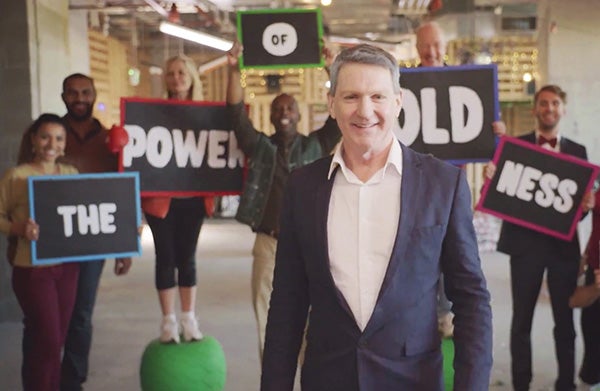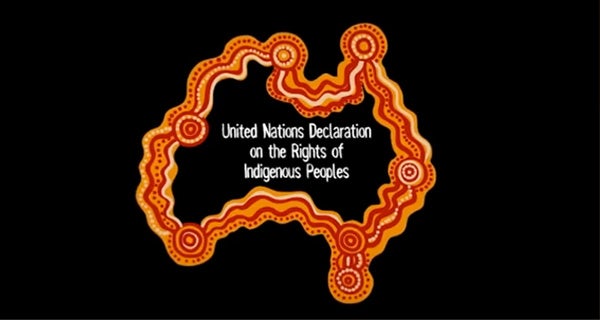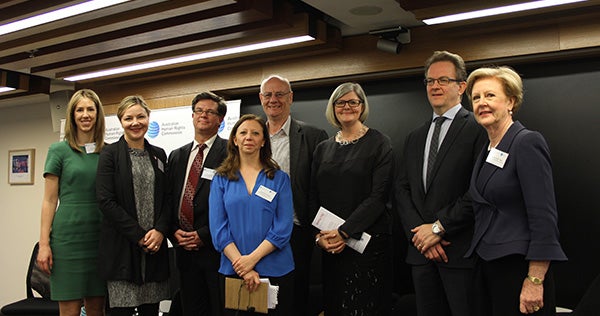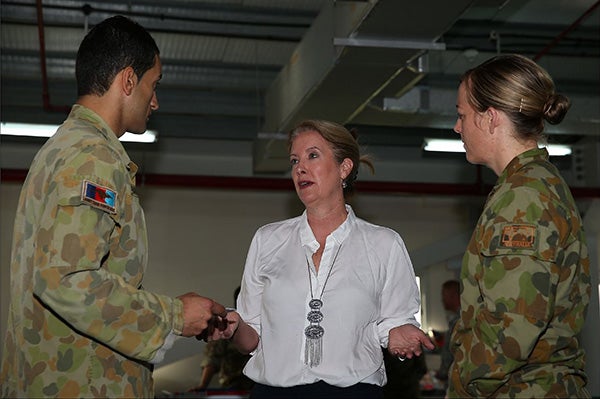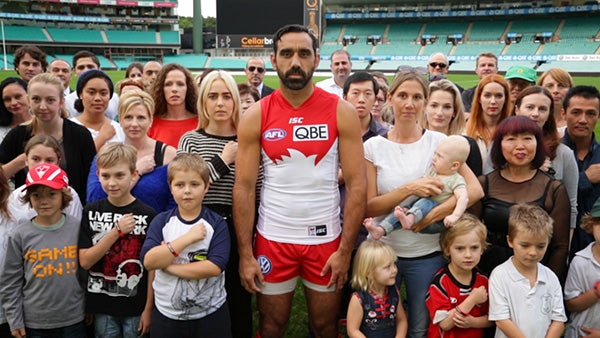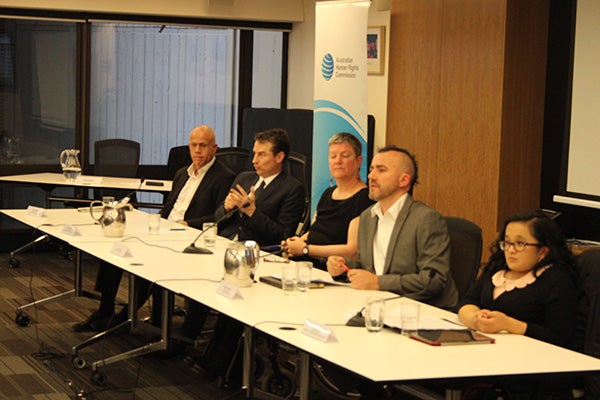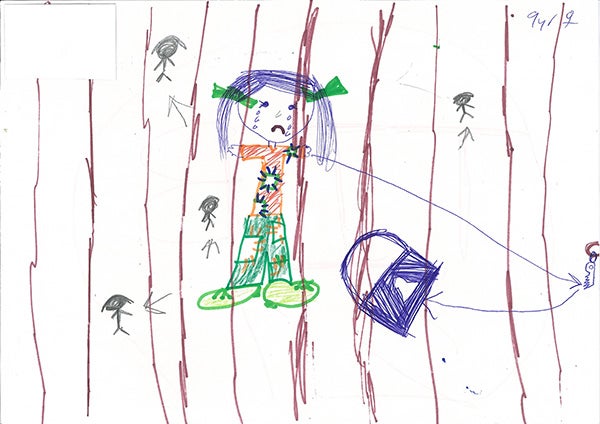Our work plan for 2014-15
Priority: Human rights education and promotion
We work to build awareness of rights and freedoms across the community, encouraging a culture of respect and responsibility that values dignity.
To make this a reality, the Commission creates a range of community engagement and human rights education programs to engage with a broad cross-section of the community. We use tools such as social media to build awareness of rights and freedoms in the community.
What we’re doing
Over 2014-2015 we will:
- Launch new teaching resources that raise awareness of human rights in the national curriculum
- Provide training to the public service through the Australian Public Service Network and the Australian Public Service Commissioner
- Develop a pilot training program on disability rights for NSW Government Ageing Disability and Home Care staff
- Work with the vocational education and training sector to integrate human rights into vocational education and training programs
- Celebrate the work of the community in promoting human rights through our annual Human Rights Awards.
The Power of Oldness
“I know what you’re thinking. I’m old. Very old. And you might be thinking, how did I get so lucky? Because, as you and I know, old people can do amazing things.”
Source: The Power of Oldness campaign video.
The Age Discrimination Commissioner has launched a video awareness campaign, The Power of Oldness. The campaign highlights the value that older people have to offer at work as well as the barriers of discrimination they face at work or when looking for work.
The United Nations Declaration on the Rights of Indigenous Peoples
“It is using the declaration that breathes life into it.”
Source: Aboriginal and Torres Strait Islander Social Justice Commissioner Mick Gooda.
The United Nations Declaration on the Rights of Indigenous Peoples (the Declaration) is the most important tool we have to protect the rights of Indigenous peoples. The Declaration elaborates on existing human rights standards and fundamental freedoms as they apply to the specific situation of Indigenous peoples. The Commission builds understanding of the Declaration with a series of ‘Declaration Dialogues’ and a range of resources for the community including a website, a ‘pocket guide’ to the Declaration and a video.
Priority: Engaging with business on human rights
The Commission prioritises collaboration with the business sector to promote enjoyment of human rights for all. We encourage innovation in how business respects, protects and promotes rights and freedoms. We provide comprehensive and effective support to prevent workplace discrimination and assist in the resolution of disputes.
What we’re doing
Over 2014-2015 we will:
- Launch a portal on our website to help businesses take steps to prevent discrimination and promote human rights
- Develop resources to support parents in the workplace, following the findings of our 2014 report on discrimination in relation to pregnancy at work and return to work after parental leave
- Work with the Australian Public Service to advocate for the inclusion of accessibility guidelines in government procurement
- Engage with our counterparts internationally through the International Coordinating Committee Working Group on Business on Human Rights on the issue of human rights and transnational corporations
- Work with male CEOs and Chairpersons to elevate the issue of women’s representation in leadership on the national business agenda.
Australian Dialogue on Business and Human Rights
The Australian Dialogue on Business and Human Rights was Australia’s first national, multi-stakeholder dialogue on business and human rights, with over 100 participants involved. Experts shared their views on the corporate responsibility to protect human rights, the role of government, access to remedy and grievance mechanisms, Indigenous engagement, and human rights in the supply chain.
The Dialogue, convened by the Commission in partnership with the Global Compact Network Australia, took place in July 2014. The Commission will co-convene a further dialogue in 2015.
Priority: Freedom from violence, harassment and bullying
Violence, harassment and bullying has a profound effect on many Australians, whose health, confidence, and capacity to participate in community life can be shattered by these acts. The Commission prioritises work that promotes safety from violence, harassment and bullying by ensuring that human rights protections are in place, by encouraging bystander action against damaging behaviours and by resolving disputes. A priority since 2010, this remains a focus for the coming year.
What we’re doing
Over 2014-2015 we will:
- Report on our examination of intentional self-harm and suicidal behaviours among children in the Children’s Rights Report 2014
- Develop an online resource for local government to prevent and respond to racism and build social cohesion in diverse communities
- Update our online resources on disability
- Deliver a ‘state of the nation’ report on sexual orientation, gender and intersex issues
- Continue our advocacy to reduce violence against women.
Cultural Change in the Australian Defence Force
“One day early last year Elizabeth Broderick called me and suggested that I needed to hear from some of the women whose experiences she had been collating ... not long after I was sitting very uncomfortably, and with mounting disbelief, through lengthy face-to-face meetings with three women who had endured appalling physical and emotional abuse at the hands of their fellow soldiers ... that was my conversion experience and it had all the qualities of the road to Damascus.”
Source: Lt Gen David Morrison AO Chief of the Australian Army.
The Commission is working closely with the Australian Defence Force to progress cultural change in Australia’s armed forces.
In 2012, the Sex Discrimination Commissioner completed a Review into the Treatment of Women in the Australian Defence Force. In 2013 and 2014 the Sex Discrimination Commissioner issued Audit Reports which considered the implementation of the recommendations from the Review Reports.
The ADF has engaged the Commission for a further four years from 1 July 2014 to assist it to embed cultural reform more broadly across the three Services. We will continue to examine issues relating to gender, as well as issues impacting on members who are Indigenous, from a culturally and linguistically diverse background or who are gay, lesbian, transgender, or intersex. The review requires the Commission to examine patterns, attitudes, and responses to domestic violence within the ADF. The impact of social media and alcohol is also being examined.
Racism. It Stops With Me
“The campaign assisted us to create a platform to get the message across: if you hear something, say something.”
“The campaign ... helps validate those who experience racism, make them aware of their rights, and help them to speak up. It opens up a conversation.”
Source: 2014 survey of organisations participating in the Racism. It Stops With Me campaign.
The Commission’s Racism. It Stops With Me campaign encourages all Australians to do what they can to combat racism. The campaign has the support of over 300 organisations.
Strategic Goal 1: Leadership
As Australian’s national human rights institution, we are respected for our independent and influential promotion of the full implementation of human rights and freedoms in Australia and internationally.
One of our tasks is to place rights and freedoms on the national agenda, ensuring they are part of public debate. As part of this, we encourage the exchange of ideas about ways to better protect rights and freedoms. We partner with governments, service providers and others, collaborating across sectors to advance the enjoyment of human rights.
We use our expertise to contribute to technical cooperation and build capacity for others to protect rights and freedoms in the region and internationally.
What we’re doing
Over 2014-2015 we will:
- Be an expert advisor on a project for NATO regarding women in the military and UNSCR 1325 – Women, Peace and Security
- Consult nationally about how well we protect people’s rights and freedoms though the Rights and Responsibilities 2014 national consultation
- Work with China and Vietnam under the China-Australia Human Rights Technical Cooperation Program and the Vietnam-Australia Human Rights Technical Program, providing support for programs in these countries and conducting monitoring visits
- Assess Australia’s implementation of its commitments made through the United Nations Universal Periodic Review Process
- Provide information to the United Nations Committee against Torture on Australia’s compliance with the Convention against Torture and Other Cruel, Inhuman or Degrading Treatment or Punishment
- Lead advocacy for Indigenous health equality through the Close the Gap campaign
- Support representatives of disability advocacy groups to participate in international forums on human rights
- Participate as a member of the Bureau of the International Coordinating Committee of NHRIs, the global coordinating agencies for human rights commissions
- Mark the 40th anniversary of the Racial Discrimination Act 1975 (Cth) with a series of activities including consultations and a symposium to critically reflect on the Act.
National Disability Forum
The National Disability Forum and accompanying survey took stock of the status of enjoyment of human rights by persons with disabilities. The forum brought together the voices of key stakeholders in the disability sector to identify human rights challenges faced by people with disabilities as well as the most strategic ways to respond to these challenges.
The National Disability Forum was held in September 2014.
Free Speech Symposium 2014
“A uniting, not dividing, approach is needed to reform restrictions on free speech.”
Source: Human Rights Commissioner Tim Wilson at the Free Speech Symposium 2014.
More than 150 people attended the Commission’s one-day symposium Free Speech 2014, held in August 2014. Hundreds more listened online. The symposium brought together notable speakers from academia, government and civil society to share knowledge, stimulate new ideas and advance the national discussion about free speech as a human right.
Strategic Goal 2: Rights and freedoms are protected
We play an important role in ensuring that human rights and freedoms are respected in Australian law, policy and practice as well as understood by the Australian community.
To do this, we analyse how law, policy and practice can better protect human rights. We work with the Joint Committee on Human Rights in the Australian Parliament to consider whether proposed new legislation raises concerns about human rights. The research, advocacy and recommendations that we provide to parliament, governments, the courts, business and the community contribute to the protection of human rights in our community.
What we’re doing
Over 2014-2015 we will:
- Undertake comprehensive research and report on the prevalence of age discrimination
- Examine Statements of Compatibility accompanying all new legislation to ensure that human rights and fundamental freedoms are respected
- Advocate for immigration and counter-terrorism policy that is compliant with Australia’s human rights obligations
- Assist the courts in discrimination and human rights cases through our intervention and amicus curiae, or ‘friend of the court’ roles
- Report on the status of the enjoyment of rights of Indigenous peoples (the annual Social Justice Report and Native Title Report) and children (the Children’s Rights Report).
National Inquiry into Children in Immigration Detention
In 2014, the Commission conducted a national inquiry into the impact of immigration detention on the health, well-being and development of children. The inquiry focuses on Australia’s laws, policies and practices relating to children in immigration detention and whether these meet Australia’s human rights obligations.
The inquiry has interviewed more than 1100 individuals in immigration detention, received over 200 submissions, convened five public hearings and visited 13 immigration detention centres.
The inquiry will report on its findings in late 2014.
Intervention function
In 2013-2014 the Commission intervened in two High Court matters.
The first was a challenge to a law prescribing a mandatory minimum term of imprisonment for a people smuggling offence. The Commission made submissions about the human rights implications of mandatory sentencing.
The second was a challenge to the validity of consorting provisions in New South Wales. The Commission made submissions as to whether these impermissibly burden the implied freedom of communication on political matters and the implied freedom of association.
Strategic Goal 3: Access to effective information and dispute resolution services
The Commission plays a crucial role in helping people to resolve complaints about discrimination and other breaches of human rights.
Our national Information Service receives over 19 000 enquiries each year and plays an important role in increasing understanding of rights and responsibilities. Our national Investigation and Conciliation Service receives over 2200 complaints each year. This service allows individuals to resolve their disputes in a timely manner and resolution of individual complaints can include outcomes that address systemic problems.
What we’re doing
Over 2014-2015 we will:
- An efficient and accessible Information Service to respond to enquiries from individuals, business and government
- An efficient and accessible Investigation and Conciliation Service to help resolve disputes affecting a range of people across Australia
- Information about rights and responsibilities under federal law to various audiences around Australia including potential complainant groups, business and government.
Complaint resolution
Last year we undertook conciliation with some 1444 complaints and 70% of these complaints were successfully resolved. This represents successful dispute resolution for more than 2034 people and organisations.
In 2013-2014, 91% of parties who participated in our Service Satisfaction Survey reported that they were satisfied with the service they received. 69% rated the service as ‘very good’ or ‘excellent’. Where complaints were conciliated, 97% of parties reported they were satisfied with the service and 77% rated the service as ‘very good ‘or ‘excellent’.
Some feedback from users of the service include:
“The service provided was exemplary, with follow up and communication throughout. All of the personnel were able to answer questions with knowledge and care” – A complainant
“I was treated with respect, dignity and empowered by the process”
– A complainant
“The service provided to all parties by Commission staff is continuously to a high standard and always in a timely manner” – A complainant advocate
“I was deeply impressed by the quality of service, fairness and integrity of the Commission staff. It was a difficult matter... but the Commission staff member was patient, reasonable and communicative.” – A respondent
“The Investigator/Conciliator managed the complaint in a professional and thoughtful manner, with a focus on an outcome that both parties could agree on in order for the complaint to be finalised” – A respondent
Strategic Goal 4: Organisational excellence
In June 2014, we introduced a new Strategic Plan for 2014-2018. The Strategic Plan commits us to working collaboratively, with innovation, and to the highest standard of excellence. This Plan provides a framework to enable us to take stock of progress in our mandate, to measure our impact over time and to assess whether we are achieving our goals.
We also strive to lead by example – by being transparent and accountable, and by operating in accordance with the human rights standards that we expect of others. We seek to minimise our environmental footprint and to practise and inspire sound corporate social responsibility.
What we’re doing
Over 2014-2015 we will:
- Monitor and evaluate our work to ensure that this makes a positive and tangible difference
- Deliver work guided by the goals, objectives and priorities identified in our Strategic Plan 2014-2018
- Work in a collaborative way, that recognises the universal and indivisible nature of human rights
- Offer a broad range of flexible working options to our staff and develop staff skills for professional growth within the Commission and beyond
- Maintain a workplace that is respectful and reflects the diversity of the Australian community.

